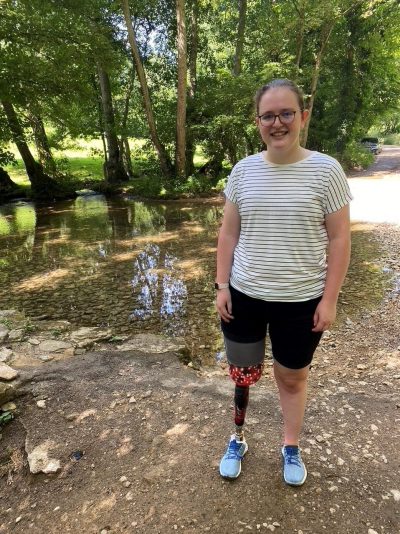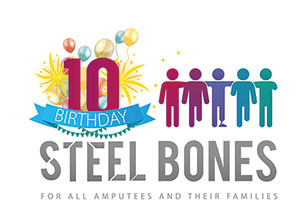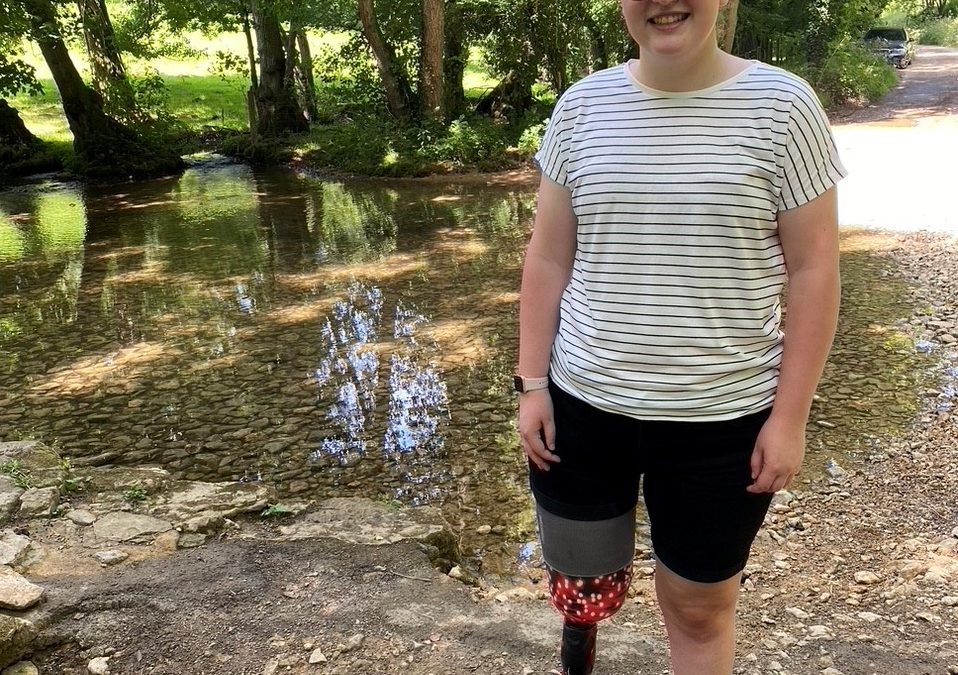What’s your name, how old are you? My name is Helena and I am 23.
Who lives with you and how old are they? Tell us a little bit about them what are their hobbies? I live with my parents and my younger brother who is 16. We are all Arsenal fans and live not far from the Emirates Stadium.
When did you become an amputee? I became a through knee amputee on 3rd of September 2019.
Have you got a name for your “stump”? No not really, I seem to call it either stump or little leg depending on how I feel.
What was the biggest concern of being an amputee? I suppose the biggest concern when I became an amputee was the potential spread of my CRPS (Complex Regional Pain Syndrome) to my stump or elsewhere in my body.
Were you able to work as an amputee? I plan to return to university in September 2020 for the final year of my degree in Education. At the moment I see no reason why I couldn’t work in the future!
What’s been the biggest challenge you have had to overcome and how did you overcome it? My biggest challenge I’ve overcome is my amputation. My amputation was considered controversial and hugely risky. The only promise the doctors could make was that my lower leg wouldn’t be there. Deciding to take the risk is probably the most challenging thing I’ve ever had to do.
How do you spend your days? During lockdown, I spent my days working on other areas of my recovery, such as being independent in the kitchen, which resulted in lots of baking! Outside of lockdown I enjoy being active, going to the gym and doing sports such as swimming and rowing. I have recently started learning to ride a bike and looking at learning to run in the future. Soon my days will be filled with university lectures!
Have you got any funny memories that have happened since your amputation? There were a couple of occasions soon after my amputation where I nearly tried to put my shoe on my stump, instead of my remaining foot.
When did you come across Steel Bones? What does Steel Bones do for your family? I first heard about Steel Bones through a friend who became an amputee a few years ago. Steel Bones has opened up lots of opportunities to meet other amputees, during lockdown I particularly enjoyed the zoom coffee mornings. For both me and my family it Steel Bones is a safe place to ask for help with anything amputee related.
Small or big is there one thing you hope to accomplish? There are two things I hope to accomplish. The first is that I complete my degree in the coming year. It hasn’t been easy with the health issues I’ve faced over the last few years. The second is to go back to kayaking and take part in sports that I couldn’t do before, like a triathlon!
How did the New Amputee Survival Guide come about? Soon into my recovery from my amputation, a friend got in touch to say she was fighting to have an amputation. She had started the process with her doctors and was soon to be referred to the same rehabilitation consultant as me. So when the time came for her amputation, I wanted to pass on the kindness and advice that had been shown to me by the amputee community. Amputations are life changing and frightening for those involved but, with all the advice and support it made it so much easier. I had collated all the advice given to me plus my experiences of the first few months. I thought this could be so beneficial to others and…New Amputee Survival Guide was born.
New Amputee Survival Guide consists of four sections: in hospital, at home, rehab, other. Full of tips, tricks and advice for new amputees. Some of it may seem so simple, but when caught up in everything that comes with amputation, having something written down can be so reassuring. When I wrote it, I kept it short and informal. From ‘nothing wrong with bum-shuffling up/down stairs’ to ‘prosthetics are daunting to start with, don’t worry you will soon become fluent in prosthetic lingo.’ It is by no means comprehensive! I hope it provides some basic pointers and reassurance, that could help a new amputee and their family in their first few weeks and months.
In hospital:
• Stay calm when the post op pain / discomfort hits. Pain doesn’t always equal problems..
• Speak up if you are in pain. Don’t try being invincible its exhausting.
• Phantom sensations/ pains are normal. Don’t worry, you will soon get used to them.
• Your stump will probably look a bit of a gory mess when the dressings get changed. It will look
better once it heals up!
• If you can try moving the missing parts of your leg, it can help ease discomfort.
• Don’t be scared to touch your stump, tapping it gently even through bandages can really help with
any phantoms or discomfort. It also helps hugely with desensitisation for prosthetics.
• Don’t stress about not being a pro at everything on one leg, before you go home. You will get your
balance, strength and confidence back soon enough.
• Get all the help you can whilst in hospital, don’t get stuck or fall. It is not worth it!
• Sleep, you are going to need it!
• Don’t be afraid to say ‘no’. If you aren’t up for it, say it! Plenty of time ahead for rehab and catching
up with others.
• Few days after your operation, find out the recovery timeline, e.g. for referrals to prosthetics.
At home:
• When you get home, put the basics where you can access them easily.
• Put your leg up!
• Have a jug of water and some biscuits/ fruit etc nearby, so you don’t have to ask others all the time.
• Have a pillow available to cushion your stump at times (follow advice from hospital to avoid causing
contractures etc).
• Do your physio, it can get repetitive but it pays dividends.
• Nothing wrong with bum-shuffling up/down stairs.
• Put a chair/ stool at the top of the stairs to help you off/onto the floor.
• Put chairs/stools anywhere that makes life easier. Its more practical to do things sat down.
• Try to get some fresh air when you can.
• Try to be clear with others, what do you need help with.
Rehab:
• Be open and ambitious about your plans for the future with your rehab & prosthetics team.
• Agree some goals with them.
• Ask about the plan going forward, when are they planning to cast you etc?
• Find out who your prosthetist is and try and meet them before you start the process of getting your
own prosthetic
• Every amputees journey through rehab is different. Try not to compare with others and don’t get
stressed if, you do or don’t do things that others have.
• Be honest with your team, if something hurts, something isn’t working for you, don’t understand
something or you aren’t certain, ask them.
• It’s a marathon not a sprint.
• Look out for any info on your local amputee or prosthetics users group. Most prosthetics clinics
have one.
• Wear shorts, its practical!
• Prosthetics are daunting to start with, don’t worry you will soon become fluent in prosthetic lingo.
• Your prosthetist will constantly be playing catch up, making you new sockets. Don’t worry it does
get easier and better.
Other:
• Loose fitting trousers or shorts are a clothing staple to begin with.
• Leggings are useful later on.
• Have a pillow in the car, sit at the back keep your leg raised.
• Some people take time to adjust to someone with an amputation. Don’t worry they will soon be
making jokes with you.
• Having multiple pairs of shoes at different heights is a thing of the past. A good pair of trainers are
worth it!
• Your wheelchair is your friend! Use it when you need to.
• If you aren’t sure about something ask fellow amputees! No question is a silly question, one of us
has probably been there too!
• Try to have some other, not physically demanding based goals and ambitions, like going on holiday
somewhere or completing a Lego set.
• A funny amputee t-shirt or something like that is a great icebreaker in public and social situations.
• There is more to amputee life than walking and sport!
• It is ok not to be ok!
CLICK HERE TO DONATE TO HELENA’S RUNNING JOURNEY: https://www.gofundme.com/f/helphelenalearntorun



LOVE! LOVE! LOVE!